| Reviews & Columns |
|
Reviews DVD TV on DVD Blu-ray 4K UHD International DVDs In Theaters Reviews by Studio Video Games Features Collector Series DVDs Easter Egg Database Interviews DVD Talk Radio Feature Articles Columns Anime Talk DVD Savant Horror DVDs The M.O.D. Squad Art House HD Talk Silent DVD
|
DVD Talk Forum |
|
|
| Resources |
|
DVD Price Search Customer Service #'s RCE Info Links |
|
Columns
|
|
|
Lives of Others, The
Sony Pictures // R // August 21, 2007
List Price: $38.96 [Buy now and save at Amazon]
Although both next-generation formats have been dominated by marquee-driven Hollywood blockbusters, Blu-ray has at least to some extent been outpaced by HD DVD when it comes to more prestigious cinema. Sony is taking steps to correct the perception that Blu-ray caters predominately to the Gen-Y gamer crowd by issuing both the fictionalized Beethoven biopic Immortal Beloved and the immeasurably acclaimed German film The Lives of Others alongside one another in high definition.
Gerd Wiesler (Ulrich Mühe) can barely be considered a man. An agent of the Stasi -- the secret police of East Berlin -- Wiesler is as much a soulless machine as the arcane equipment he uses to spy on his fellow countrymen. It's an existence devoid of emotion, defined purely by his skill at peering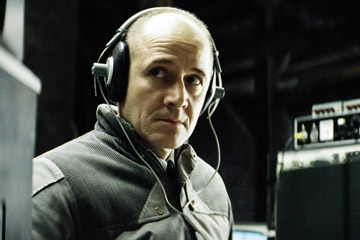 into the lives of others, be it through interrogations that last days at a time or by listening from afar. He has no friends. No passions. No lovers, save those on the Stasi's payroll reserved for that express purpose. Wiesler remains an empty shell until he's tasked with eavesdropping on playwright Georg Dreyman (Sebastian Koch).
into the lives of others, be it through interrogations that last days at a time or by listening from afar. He has no friends. No passions. No lovers, save those on the Stasi's payroll reserved for that express purpose. Wiesler remains an empty shell until he's tasked with eavesdropping on playwright Georg Dreyman (Sebastian Koch).
It's an investigation borne out of ambition, routine, and jealousy; Dreyman is the GDR's most patriotic artistic voice and has done nothing to suggest any subversive leanings. Wiesler settles into an attic above Dreyman's flat nonetheless, listening to his every word and documenting everything that's overheard -- politically charged or otherwise -- into a series of meticulously detailed reports. Wiesler grows increasingly fascinated with the playwright, empowered secondhand by Dreyman's artistry and his smoldering relationship with actress Christa-Maria Sieland (Martina Gedeck), a woman hiding her own share of dark secrets. This stirring in Wiesler comes as Dreyman starts to become more politically active, hosting meetings that he's confident couldn't possibly be under surveillance given his reputation as a patriot, as he and his friends secretly pen a magazine cover story deeply critical of the GDR. As Dreyman feels compelled to take risks to support what he believes in, so does Wiesler, risking a livelihood he's spent decades building by fabricating reports on behalf of a man he's only seen from a distance.
It's an intriguing reversal of roles. The playwright has taken extreme measures to covertly write a politically charged article about suppressed suicide statistics for the Western magazine Spiegel, and meanwhile, Wiesler -- a man who's devoted his life to coldly documenting facts with a political bent -- is now writing a sort of fiction as he submits false reports to his superiors. Dreyman and Sieland have earned considerable fame for their work in the theater, but Wiesler gets to enjoy them on a much more intimate stage. Aching for companionship, Wiesler even establishes a sort of relationship by proxy with the actress. He introduces himself to Sieland in a tavern by telling her "I am your audience", a seemingly innocuous statement with undertones it takes her a great deal of time to appreciate.
Writer/director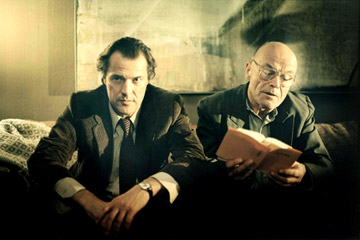 Florian Henckel von Donnersmarck helms The Lives of Others with such a sure hand that there's little to suggest that this is his first time stepping behind the camera as a feature filmmaker. Its economy is striking. Despite the film's 137 minute runtime, not a moment of it is unnecessary: every expression, every line of dialogue, and every note of music. Not all of it may contribute directly to advancing the story, no, but there isn't a single frame that's put to waste. One of von Donnersmarck's greatest strengths is his ability to create such a well-realized world, utilizing some of these quieter moments and the immaculate production design to draw his characters as richly as possible. The Lives of Others succeeds in large part because the audience finds these other characters as fascinating as Wiesler does. The film generates tension and intrigue not through trite thriller clichés or computer-generated theatrics, but by relying on its characterization and a thoroughly convincing reproduction of East Berlin circa the appropriately Orwellian 1984.
Florian Henckel von Donnersmarck helms The Lives of Others with such a sure hand that there's little to suggest that this is his first time stepping behind the camera as a feature filmmaker. Its economy is striking. Despite the film's 137 minute runtime, not a moment of it is unnecessary: every expression, every line of dialogue, and every note of music. Not all of it may contribute directly to advancing the story, no, but there isn't a single frame that's put to waste. One of von Donnersmarck's greatest strengths is his ability to create such a well-realized world, utilizing some of these quieter moments and the immaculate production design to draw his characters as richly as possible. The Lives of Others succeeds in large part because the audience finds these other characters as fascinating as Wiesler does. The film generates tension and intrigue not through trite thriller clichés or computer-generated theatrics, but by relying on its characterization and a thoroughly convincing reproduction of East Berlin circa the appropriately Orwellian 1984.
There's such an attention to detail that The Lives of Others could easily be mistaken for an adaptation of a true story. Although the background for the film was intensely researched, The Lives of Others doesn't bombard viewers with minutiae. Instead those details lurk in the margins throughout its dialogue and the remarkably well-dressed sets, each helping to establish a sense of this dark period of time in East Germany.
Masterfully constructed by the late Ulrich Mühe, every aspect of Wiesler -- his detachment from the world at large despite tethering his life around the secrets and intimacies of others, being overcome by the majesty of an art...of a love...the likes of which he never knew existed -- are clearly and concisely conveyed with minimal dialogue and subtle facial expressions. It takes a colossal talent to express so much through actions this deceptively spartan. von Donnersmarck has the confidence as a writer and director to allow his actors to act, generating tremendously powerful emotions without resorting to syrupy strings or overwrought monologues. It's understandable that some may feel that von Donnersmarck takes the emotional restraint to an extreme; this isn't a sweeping historical romance with violins punctuating any sort of climactic kiss. This subdued approach seems entirely appropriate to the setting...that these emotions, particularly Wiesler's, would be masked and internalized, and it's up to the audience to interpret those sentiments rather than be bludgeoned over the head with them.
The film's political undertones are equally fascinating. Despite the pervasive 'us versus them' mentality expressed by so many characters throughout the film, no one really seems to truly believe in the GDR. No matter how extreme the actions of the Stasi's agents may be, it's not motivated by political ideology but is purely a means an end, be it a response to fear, the need for a paycheck, or just an eye on a posh corner office. von Donnersmarck offers these insights into both the human condition and the political landscape of East Germany in 1984 without wielding too heavy a hand, as confident in his audience's ability to interpret the material as he is in his own writing and direction.
After winning scores of statuettes in its native Germany, The Lives of Others went on to be awarded the Oscar for Best Foreign Language Film. The Lives of Others is a superb work that would be well worth discovering on any format, but to be able to enjoy it in high definition at a time when sales in an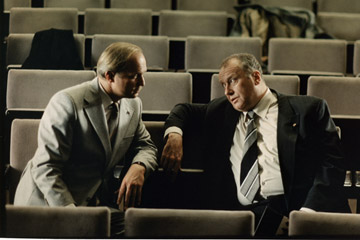 already small market are leaning towards a completely different sort of movie makes this Blu-ray release that much more exceptional. Highly Recommended.
already small market are leaning towards a completely different sort of movie makes this Blu-ray release that much more exceptional. Highly Recommended.
Video: The Lives of Others boasts a strong 2.39:1 high definition presentation on Blu-ray, encoded using Sony's recent codec of choice, AVC. The image doesn't instantly dazzle the way so many other day-and-date releases often have on the format, but I'd imagine much of this is a result of a deliberate photographic style and perhaps its modest budget as well. The cold, subdued palette reflects the sterility of East Germany at this point in time, and director Florian Henckel von Donnersmarck notes throughout the audio commentary how the production design intentionally limited the use of shades of blue and red, with just a pair of exceptions. Clarity and the presence of fine detail aren't particularly exceptional but are instantly identifiable as high definition, and if the standard definition clips in the extras on the disc are any indication, this Blu-ray release should offer a tremendous upgrade over the DVD.
The film's faintly gritty texture becomes far more pronounced throughout the more dimly-lit exteriors as the image swarms with grain, and presumably as a result of the lenses used in the photography, the edges of the frame are at times blurry and less distinct. Some light ringing was also infrequently spotted around high-contrast areas. There are a couple of tiny flecks scattered throughout its earliest moments, but they're easily ignored and don't appear throughout the remainder of the film.
The Lives of Others may not be shimmering high definition eye candy, but it is a visually striking film that benefits greatly from the additional resolution that Blu-ray has to offer.
Audio: The disc's audio is presented exclusively in German, both as an uncompressed PCM 5.1 track and as a traditional six-channel Dolby Digital mix. The sound design of The Lives of Others is understandably subdued, considering that this is a film that doesn't rely on shoot-outs, megaton explosions, or breakneck car chases to build tension. The surround channels are typically used to reinforce the score as well as the reverberations throughout some of the film's more cavernous sets. Some light ambiance in the rears also further flesh out Dreyman's lively birthday party and the streets of Berlin. The subwoofer is reserved primarily for the robust low-end of Gabriel Yared's score, but slammed doors, the throaty roar of car engines, and even a cork popping off a bottle of champagne are accompanied by a modest low-frequency kick. The film's dialogue is rendered cleanly and clearly, emerging without any concerns whatsoever. There isn't any need for a bombastic, aggressive mix considering The Lives of Others' comparatively low-key approach, but for a film so driven by its music and dialogue, the audio is flawless.
The selection of subtitles include English, French, Spanish, and a secondary English subtitle stream for the hard of hearing. Owners of constant height front projection setups may be interested to note that the subtitles are rendered entirely inside the 2.39:1 frame rather than overlapping with any letterboxing bars.
Extras: The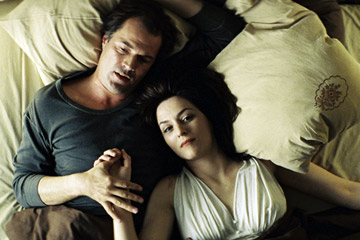 only of the disc's extras that are in high-definition are trailers for Perfect Stranger, Premonition, Reign Over Me, and, also starring Sebastian Koch, Black Book. The remaining features are carried over in standard definition from the DVD release.
only of the disc's extras that are in high-definition are trailers for Perfect Stranger, Premonition, Reign Over Me, and, also starring Sebastian Koch, Black Book. The remaining features are carried over in standard definition from the DVD release.
Carrying a 137 minute audio commentary without anyone else in the room to prompt discussion is a daunting task, but writer/director Florian Henckel von Donnersmarck proves himself up to the challenge. Speaking comfortably in English with little trace of an accent, von Donnersmarck is a remarkably engaging speaker and has no difficulty filling the disc's ample runtime with barely any gaps in the discussion at all. His commentary is teeming with intriguing notes about the production: why the movie opens without the usual title sequence or barrage of credits, the hurdles in assembling this sort of cast as a first-time feature filmmaker, his preference for finding strength in details as small as the tempo of Wiesler's typing, the disinterest of German distributors in the film, struggling with a budget that amounts to a paltry two million American dollars, the twelve frame difference between this release and his "director's cut", and the ambiguity of one final, dramatic act. von Donnersmarck also expands on the background of this specific period of East Germany, noting how Ulrich Mühe himself was once under surveillance by the Stasi. His tangents are every bit as interesting, discussing how he'd see movies purely because Patricia Rommel held an editing credit and waxing enthusiastic about his favorite works of art from the GDR. The director also takes care to give Blu-ray a nod when noting one detail that may be indiscernable on a less revealing format. This is a tremendous audio commentary, and I hope it's just the first of many from von Donnersmarck.
The director appears again in a half hour interview, also presented with von Donnersmarck speaking in English. Given how thorough and comprehensive his audio commentary is, it's understandable that there is a fair amount of overlap in this interview, although there's more than enough unique material to make it well worth setting aside the time to watch. von Donnersmarck elaborates on the lengthy research period and notes how many of his actors hailed from East Germany despite his not making a deliberate effort to cast in that way. Authenticity is a particularly favorite topic, noting how budgetary concerns necessitated the use of real locations, and the director also delves into how he and his crew recreated Berlin circa 1984 without the use of digital technology. After a lengthy exploration into the music of the film, von Donnersmarck discusses the critical and commercial reception to The Lives of Others in Germany and throughout the world, likening cinema to a sort of therapy and analyzing the way the film compares and contrasts emotion and principle.
A reel of seven deleted and extended scenes runs right at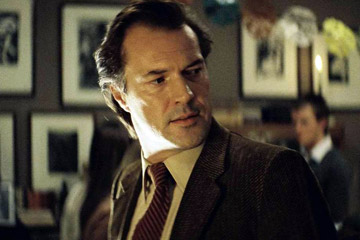 nine minutes in length. Among them are a lengthier glimpse into Wiesler's personal life -- which he naturally devotes part of to reporting on his neighbors' illicit activites -- and a longer version of the scene with the bloated prostitute. Dreyman is the focus of several scenes, particularly as his fortieth birthday party is expanded to include an attempt to defuse tension among his guests by sitting down at the piano and another extension in which he listens to his mentor recite a poem. This footage is letterboxed in non-anamorphic widescreen, and it's presented in German with fixed subtitles. von Donnersmarck offers optional audio commentary in which he notes why these scenes were removed, how he cut one scene before a copyright snag could have become a concern, and the challenges in finding a suitable prostitute in a pool of actresses and actual hookers.
nine minutes in length. Among them are a lengthier glimpse into Wiesler's personal life -- which he naturally devotes part of to reporting on his neighbors' illicit activites -- and a longer version of the scene with the bloated prostitute. Dreyman is the focus of several scenes, particularly as his fortieth birthday party is expanded to include an attempt to defuse tension among his guests by sitting down at the piano and another extension in which he listens to his mentor recite a poem. This footage is letterboxed in non-anamorphic widescreen, and it's presented in German with fixed subtitles. von Donnersmarck offers optional audio commentary in which he notes why these scenes were removed, how he cut one scene before a copyright snag could have become a concern, and the challenges in finding a suitable prostitute in a pool of actresses and actual hookers.
Also in German and subtitled in English is "The Making of The Lives of Others". Interviewed throughout the half-hour featurette are writer/director Florian Henckel von Donnersmarck, historical advisor Manfred Wilke, actors Sebastian Koch, Ulrich Tukur, Ulrich Mühe, Martina Gedeck, and producers Quirin Berg and Max Wiedemann, who note their responses to the material, the process of shooting the film, and the real-life political climate that inspired it. The challenges of shooting a period piece in modern day Berlin are touched on in somewhat more detail than the other extras on the disc, and the featurette also includes a lengthy montage detailing The Lives of Others' enormous success at the Lola Awards, the German equivalent to our Academy Awards.
Conclusion: One of the most widely critically acclaimed releases of the past year, The Lives of Others is an exceptional film and one well worth discovering on Blu-ray. If you've ever rolled your eyes at the sight of movies like Ghost Rider topping Blu-ray sales charts, support quality cinema and prove that there is a market for this sort of film in high definition. Highly Recommended.
Gerd Wiesler (Ulrich Mühe) can barely be considered a man. An agent of the Stasi -- the secret police of East Berlin -- Wiesler is as much a soulless machine as the arcane equipment he uses to spy on his fellow countrymen. It's an existence devoid of emotion, defined purely by his skill at peering
 into the lives of others, be it through interrogations that last days at a time or by listening from afar. He has no friends. No passions. No lovers, save those on the Stasi's payroll reserved for that express purpose. Wiesler remains an empty shell until he's tasked with eavesdropping on playwright Georg Dreyman (Sebastian Koch).
into the lives of others, be it through interrogations that last days at a time or by listening from afar. He has no friends. No passions. No lovers, save those on the Stasi's payroll reserved for that express purpose. Wiesler remains an empty shell until he's tasked with eavesdropping on playwright Georg Dreyman (Sebastian Koch). It's an investigation borne out of ambition, routine, and jealousy; Dreyman is the GDR's most patriotic artistic voice and has done nothing to suggest any subversive leanings. Wiesler settles into an attic above Dreyman's flat nonetheless, listening to his every word and documenting everything that's overheard -- politically charged or otherwise -- into a series of meticulously detailed reports. Wiesler grows increasingly fascinated with the playwright, empowered secondhand by Dreyman's artistry and his smoldering relationship with actress Christa-Maria Sieland (Martina Gedeck), a woman hiding her own share of dark secrets. This stirring in Wiesler comes as Dreyman starts to become more politically active, hosting meetings that he's confident couldn't possibly be under surveillance given his reputation as a patriot, as he and his friends secretly pen a magazine cover story deeply critical of the GDR. As Dreyman feels compelled to take risks to support what he believes in, so does Wiesler, risking a livelihood he's spent decades building by fabricating reports on behalf of a man he's only seen from a distance.
It's an intriguing reversal of roles. The playwright has taken extreme measures to covertly write a politically charged article about suppressed suicide statistics for the Western magazine Spiegel, and meanwhile, Wiesler -- a man who's devoted his life to coldly documenting facts with a political bent -- is now writing a sort of fiction as he submits false reports to his superiors. Dreyman and Sieland have earned considerable fame for their work in the theater, but Wiesler gets to enjoy them on a much more intimate stage. Aching for companionship, Wiesler even establishes a sort of relationship by proxy with the actress. He introduces himself to Sieland in a tavern by telling her "I am your audience", a seemingly innocuous statement with undertones it takes her a great deal of time to appreciate.
Writer/director
 Florian Henckel von Donnersmarck helms The Lives of Others with such a sure hand that there's little to suggest that this is his first time stepping behind the camera as a feature filmmaker. Its economy is striking. Despite the film's 137 minute runtime, not a moment of it is unnecessary: every expression, every line of dialogue, and every note of music. Not all of it may contribute directly to advancing the story, no, but there isn't a single frame that's put to waste. One of von Donnersmarck's greatest strengths is his ability to create such a well-realized world, utilizing some of these quieter moments and the immaculate production design to draw his characters as richly as possible. The Lives of Others succeeds in large part because the audience finds these other characters as fascinating as Wiesler does. The film generates tension and intrigue not through trite thriller clichés or computer-generated theatrics, but by relying on its characterization and a thoroughly convincing reproduction of East Berlin circa the appropriately Orwellian 1984.
Florian Henckel von Donnersmarck helms The Lives of Others with such a sure hand that there's little to suggest that this is his first time stepping behind the camera as a feature filmmaker. Its economy is striking. Despite the film's 137 minute runtime, not a moment of it is unnecessary: every expression, every line of dialogue, and every note of music. Not all of it may contribute directly to advancing the story, no, but there isn't a single frame that's put to waste. One of von Donnersmarck's greatest strengths is his ability to create such a well-realized world, utilizing some of these quieter moments and the immaculate production design to draw his characters as richly as possible. The Lives of Others succeeds in large part because the audience finds these other characters as fascinating as Wiesler does. The film generates tension and intrigue not through trite thriller clichés or computer-generated theatrics, but by relying on its characterization and a thoroughly convincing reproduction of East Berlin circa the appropriately Orwellian 1984. There's such an attention to detail that The Lives of Others could easily be mistaken for an adaptation of a true story. Although the background for the film was intensely researched, The Lives of Others doesn't bombard viewers with minutiae. Instead those details lurk in the margins throughout its dialogue and the remarkably well-dressed sets, each helping to establish a sense of this dark period of time in East Germany.
Masterfully constructed by the late Ulrich Mühe, every aspect of Wiesler -- his detachment from the world at large despite tethering his life around the secrets and intimacies of others, being overcome by the majesty of an art...of a love...the likes of which he never knew existed -- are clearly and concisely conveyed with minimal dialogue and subtle facial expressions. It takes a colossal talent to express so much through actions this deceptively spartan. von Donnersmarck has the confidence as a writer and director to allow his actors to act, generating tremendously powerful emotions without resorting to syrupy strings or overwrought monologues. It's understandable that some may feel that von Donnersmarck takes the emotional restraint to an extreme; this isn't a sweeping historical romance with violins punctuating any sort of climactic kiss. This subdued approach seems entirely appropriate to the setting...that these emotions, particularly Wiesler's, would be masked and internalized, and it's up to the audience to interpret those sentiments rather than be bludgeoned over the head with them.
The film's political undertones are equally fascinating. Despite the pervasive 'us versus them' mentality expressed by so many characters throughout the film, no one really seems to truly believe in the GDR. No matter how extreme the actions of the Stasi's agents may be, it's not motivated by political ideology but is purely a means an end, be it a response to fear, the need for a paycheck, or just an eye on a posh corner office. von Donnersmarck offers these insights into both the human condition and the political landscape of East Germany in 1984 without wielding too heavy a hand, as confident in his audience's ability to interpret the material as he is in his own writing and direction.
After winning scores of statuettes in its native Germany, The Lives of Others went on to be awarded the Oscar for Best Foreign Language Film. The Lives of Others is a superb work that would be well worth discovering on any format, but to be able to enjoy it in high definition at a time when sales in an
 already small market are leaning towards a completely different sort of movie makes this Blu-ray release that much more exceptional. Highly Recommended.
already small market are leaning towards a completely different sort of movie makes this Blu-ray release that much more exceptional. Highly Recommended. Video: The Lives of Others boasts a strong 2.39:1 high definition presentation on Blu-ray, encoded using Sony's recent codec of choice, AVC. The image doesn't instantly dazzle the way so many other day-and-date releases often have on the format, but I'd imagine much of this is a result of a deliberate photographic style and perhaps its modest budget as well. The cold, subdued palette reflects the sterility of East Germany at this point in time, and director Florian Henckel von Donnersmarck notes throughout the audio commentary how the production design intentionally limited the use of shades of blue and red, with just a pair of exceptions. Clarity and the presence of fine detail aren't particularly exceptional but are instantly identifiable as high definition, and if the standard definition clips in the extras on the disc are any indication, this Blu-ray release should offer a tremendous upgrade over the DVD.
The film's faintly gritty texture becomes far more pronounced throughout the more dimly-lit exteriors as the image swarms with grain, and presumably as a result of the lenses used in the photography, the edges of the frame are at times blurry and less distinct. Some light ringing was also infrequently spotted around high-contrast areas. There are a couple of tiny flecks scattered throughout its earliest moments, but they're easily ignored and don't appear throughout the remainder of the film.
The Lives of Others may not be shimmering high definition eye candy, but it is a visually striking film that benefits greatly from the additional resolution that Blu-ray has to offer.
Audio: The disc's audio is presented exclusively in German, both as an uncompressed PCM 5.1 track and as a traditional six-channel Dolby Digital mix. The sound design of The Lives of Others is understandably subdued, considering that this is a film that doesn't rely on shoot-outs, megaton explosions, or breakneck car chases to build tension. The surround channels are typically used to reinforce the score as well as the reverberations throughout some of the film's more cavernous sets. Some light ambiance in the rears also further flesh out Dreyman's lively birthday party and the streets of Berlin. The subwoofer is reserved primarily for the robust low-end of Gabriel Yared's score, but slammed doors, the throaty roar of car engines, and even a cork popping off a bottle of champagne are accompanied by a modest low-frequency kick. The film's dialogue is rendered cleanly and clearly, emerging without any concerns whatsoever. There isn't any need for a bombastic, aggressive mix considering The Lives of Others' comparatively low-key approach, but for a film so driven by its music and dialogue, the audio is flawless.
The selection of subtitles include English, French, Spanish, and a secondary English subtitle stream for the hard of hearing. Owners of constant height front projection setups may be interested to note that the subtitles are rendered entirely inside the 2.39:1 frame rather than overlapping with any letterboxing bars.
Extras: The
 only of the disc's extras that are in high-definition are trailers for Perfect Stranger, Premonition, Reign Over Me, and, also starring Sebastian Koch, Black Book. The remaining features are carried over in standard definition from the DVD release.
only of the disc's extras that are in high-definition are trailers for Perfect Stranger, Premonition, Reign Over Me, and, also starring Sebastian Koch, Black Book. The remaining features are carried over in standard definition from the DVD release. Carrying a 137 minute audio commentary without anyone else in the room to prompt discussion is a daunting task, but writer/director Florian Henckel von Donnersmarck proves himself up to the challenge. Speaking comfortably in English with little trace of an accent, von Donnersmarck is a remarkably engaging speaker and has no difficulty filling the disc's ample runtime with barely any gaps in the discussion at all. His commentary is teeming with intriguing notes about the production: why the movie opens without the usual title sequence or barrage of credits, the hurdles in assembling this sort of cast as a first-time feature filmmaker, his preference for finding strength in details as small as the tempo of Wiesler's typing, the disinterest of German distributors in the film, struggling with a budget that amounts to a paltry two million American dollars, the twelve frame difference between this release and his "director's cut", and the ambiguity of one final, dramatic act. von Donnersmarck also expands on the background of this specific period of East Germany, noting how Ulrich Mühe himself was once under surveillance by the Stasi. His tangents are every bit as interesting, discussing how he'd see movies purely because Patricia Rommel held an editing credit and waxing enthusiastic about his favorite works of art from the GDR. The director also takes care to give Blu-ray a nod when noting one detail that may be indiscernable on a less revealing format. This is a tremendous audio commentary, and I hope it's just the first of many from von Donnersmarck.
The director appears again in a half hour interview, also presented with von Donnersmarck speaking in English. Given how thorough and comprehensive his audio commentary is, it's understandable that there is a fair amount of overlap in this interview, although there's more than enough unique material to make it well worth setting aside the time to watch. von Donnersmarck elaborates on the lengthy research period and notes how many of his actors hailed from East Germany despite his not making a deliberate effort to cast in that way. Authenticity is a particularly favorite topic, noting how budgetary concerns necessitated the use of real locations, and the director also delves into how he and his crew recreated Berlin circa 1984 without the use of digital technology. After a lengthy exploration into the music of the film, von Donnersmarck discusses the critical and commercial reception to The Lives of Others in Germany and throughout the world, likening cinema to a sort of therapy and analyzing the way the film compares and contrasts emotion and principle.
A reel of seven deleted and extended scenes runs right at
 nine minutes in length. Among them are a lengthier glimpse into Wiesler's personal life -- which he naturally devotes part of to reporting on his neighbors' illicit activites -- and a longer version of the scene with the bloated prostitute. Dreyman is the focus of several scenes, particularly as his fortieth birthday party is expanded to include an attempt to defuse tension among his guests by sitting down at the piano and another extension in which he listens to his mentor recite a poem. This footage is letterboxed in non-anamorphic widescreen, and it's presented in German with fixed subtitles. von Donnersmarck offers optional audio commentary in which he notes why these scenes were removed, how he cut one scene before a copyright snag could have become a concern, and the challenges in finding a suitable prostitute in a pool of actresses and actual hookers.
nine minutes in length. Among them are a lengthier glimpse into Wiesler's personal life -- which he naturally devotes part of to reporting on his neighbors' illicit activites -- and a longer version of the scene with the bloated prostitute. Dreyman is the focus of several scenes, particularly as his fortieth birthday party is expanded to include an attempt to defuse tension among his guests by sitting down at the piano and another extension in which he listens to his mentor recite a poem. This footage is letterboxed in non-anamorphic widescreen, and it's presented in German with fixed subtitles. von Donnersmarck offers optional audio commentary in which he notes why these scenes were removed, how he cut one scene before a copyright snag could have become a concern, and the challenges in finding a suitable prostitute in a pool of actresses and actual hookers. Also in German and subtitled in English is "The Making of The Lives of Others". Interviewed throughout the half-hour featurette are writer/director Florian Henckel von Donnersmarck, historical advisor Manfred Wilke, actors Sebastian Koch, Ulrich Tukur, Ulrich Mühe, Martina Gedeck, and producers Quirin Berg and Max Wiedemann, who note their responses to the material, the process of shooting the film, and the real-life political climate that inspired it. The challenges of shooting a period piece in modern day Berlin are touched on in somewhat more detail than the other extras on the disc, and the featurette also includes a lengthy montage detailing The Lives of Others' enormous success at the Lola Awards, the German equivalent to our Academy Awards.
Conclusion: One of the most widely critically acclaimed releases of the past year, The Lives of Others is an exceptional film and one well worth discovering on Blu-ray. If you've ever rolled your eyes at the sight of movies like Ghost Rider topping Blu-ray sales charts, support quality cinema and prove that there is a market for this sort of film in high definition. Highly Recommended.
|
| Popular Reviews |
| Sponsored Links |
|
|
| Sponsored Links |
|
|
| Release List | Reviews | Shop | Newsletter | Forum | DVD Giveaways | Blu-Ray | Advertise |
|
Copyright 2024 DVDTalk.com All Rights Reserved. Legal Info, Privacy Policy, Terms of Use,
Manage Preferences,
Your Privacy Choices | |||||||












